PhD, Postdoc, and Professor Salaries in Germany
Germany is one of the leading countries for research and a hub for innovation. The country’s high quality of life combined with lower cost of living make it an attractive destination for international researchers. Are you contemplating a move to Germany? Here is a breakdown of the most common German academic jobs and their salaries. All salary statistics in this article are in Euros per month and are pre-tax.
Doctorate Degree
In Germany applicants must apply for a preset doctoral project that is usually tied to a professor’s own research. Students do not do any coursework; they start working on their project immediately. They are also required to take on some teaching responsibilities. The time it takes to earn a doctorate depends on the field, but three to five years is typical.
The salaries of PhD students are based on the federal wage agreement ( Tarifvertrag der Länder or TV-L). There are several pay scales ( Entgeltgruppe ) within the TV-L but PhD students are usually paid at the TV-L E13 level. Within this level, there are three factors that determine the student’s actual salary. The first is the pay grade ( Stufe ) which is based on the number of years of experience you have. Most PhD students start at Stufe 1 and progress through the grades as they gain years of seniority. The next factor is the working hours (50%, 67%, 75%, or 100%) and the final factor which federal state the university is in. You can find the salary calculators for each state here . For example, the salary range for a 100% PhD student is €4,053-€5,701 per month while the range for a 67% PhD student is €2,729-€3,820 per month.
Postdoctoral Researcher/Fellow
After earning their doctorate, researchers go on to a postdoc. A postdoc is a continuation of the researcher’s training that allows them to further specialize in a particular field and learn new skills and techniques. It may require them to take on teaching responsibilities. German postdocs typically last two to four years.
Like all non-tenured academic positions in Germany, postdoc salaries are fairly rigid. They are based on the same TV-L federal wage agreement as PhD salaries. The salaries are determined the same way too, taking into account pay scale, pay grade, working hours, and state. You can find the salary calculators for each state here . Postdocs are paid at the E13 or (less commonly) E14 level , with the exact starting pay grade depending on how their years of experience (bachelor's, Master’s, and PhD) are counted. The salary range for a 100% E13 postdoc is €4,053-€5,701 per month and the salary range for a 100% E14 postdoc is €4,419-€6,076 per month.
Juniorprofessur/Juniordozent
Junior professors positions offer early career academics the opportunity to research, supervision, administration, and teaching experience on equal terms to other university instructors. Junior professorships are usually for three to four years and can be extended for a total of six years. It is often a temporary position, however, certain universities offer a tenure-track option. Germany has recently signed an agreement to create 1,000 tenure-track junior professorships by 2032.
Junior professors, like all German professors, are paid according to the W- Besoldung salary table . This scale dictates base salaries according to which state the university is in. Unlike the PhD and postdoc pay scale, there are no pay grades within this scale. A W1 professor will make minimum €4,713-€5,301 per month.
Professur (W2)
To become a professor, an academic needs to have completed the Habilitation, have a positive evaluation as a junior professor, or have led their own junior research group. W2 professors are considered independent researchers and generally have permanent positions. Internal promotion to these positions is not encouraged in Germany. With the exceptions of junior professors, academics cannot be appointed a professor at the university they did their Habilitation.
The base salary for a W2 professor is €5,365-€6,676 per month depending on which state the university is in. In Bund, Bayern, Hessen, and Sachsen there are multiple pay grades within the W2 band meaning the professor’s salary will increase in five or seven years in the position. Salaries can also be increased by family allowances, retention payments, and performance bonuses. As professors are civil servants with high job security, they do not typically pay the same social insurance contributions as other employees.
Professur (W3)
A W3 professor is the highest German academic position that usually involves responsibility of a chair or for an institute. The requirements to become a full professor are very demanding and as a consequence, there is often a minimum age requirement for this sort of professorship. Professors in Germany are public servants and as such have permanent positions at their universities.
The base salary for a W3 professor is €5,343-€7,578 per month depending on which state the university is in. In Bund, Bayern, Hessen, and Sachsen there are multiple pay grades within the W3 band meaning the professor’s salary will increase in five or seven years in the position. Salaries can also be increased by family allowances, retention payments, and performance bonuses. As professors are civil servants with high job security, they do not typically pay the same social insurance contributions as other employees.

Discover related jobs
Discover similar employers
Accelerate your academic career
The Best Questions to Ask During a PhD Interview
Coming to a PhD interview prepared with some questions to ask shows the ...
German Academic Job Titles Explained
German job titles are slightly different from their American equivalents...
How to Write a Professional Academic CV
No matter what stage you are at in your academic career, having an acade...
PhD, Postdoc, and Professor Salaries in France
France has a strong academic tradition and is committed to investing in ...
More International Researchers Means Better Science
A study in Nature shows the benefit of attracting global research talent...
Preparing for Your PhD Defence
Here are some tips to help you beat the nerves and rock your defence.
Jobs by field
- Machine Learning 177
- Electrical Engineering 169
- Artificial Intelligence 165
- Programming Languages 139
- Molecular Biology 114
- Materials Chemistry 102
- Electronics 101
- Cell Biology 96
- Mechanical Engineering 93
- Engineering Physics 90
Jobs by type
- Postdoc 318
- Assistant / Associate Professor 178
- Professor 131
- Researcher 130
- Research assistant 97
- Lecturer / Senior Lecturer 80
- Engineer 56
- Tenure Track 52
- Management / Leadership 50
Jobs by country
- Belgium 274
- Netherlands 171
- Switzerland 125
- Luxembourg 48
Jobs by employer
- KU Leuven 98
- Mohammed VI Polytechnic Unive... 94
- Ghent University 70
- ETH Zürich 70
- Eindhoven University of Techn... 49
- University of Luxembourg 46
- KTH Royal Institute of Techno... 45
- University of Twente 43
- Manchester Metropolitan Unive... 38
This website uses cookies
- Guide to positions
- Study in Germany
- PhD in Germany
- Postdoc in Germany
- Professor in Germany
- HAW Professorship in Germany
- Thematic guide
- Working in Germany
- Working in Austria
- Working in Switzerland
- Higher education in Germany
- Job profiles
- Service range
- Graduate schools
- Career Advice Overview
Doctorate salaries What does a doctoral candidate earn in Germany?
A doctoral degree will certainly only help you to become rich in an idealistic sense. The first contract for a PhD position should have a term of at least one year - after which, graduates are rewarded with their first salary increase.

What determines the salary of doctoral candidates in Germany?
Which pay band applies to doctoral students in germany, what is the salary of doctorate students in germany, what are levels of experience and how do i gain relevant professional experience during my phd degree in germany, does changing to another research project or institute in germany have an impact on postgraduates' experience level, if doctoral candidates go abroad, become temporarily unemployed or receive a scholarship, what effect does this have on their experience level, what additional salary benefits are there for postgraduates in germany.
Most doctoral candidates are appointed at a university or non-university research institution through a third-party centre or funding centre. These are all civil service institutions, so the salary for employed doctoral candidates is either based on the collective agreement for civil service (TVoeD) or the collective agreement for the civil service in the individual federal states (TV-L). Hesse, which is not a member of the collective agreement community of the federal states, has its own TV-H collective agreement. Other ways to finance your own PhD as a junior scientist include a PhD scholarship, an industrial PhD programme at a research institute in the private sector or an extra-occupational PhD. Even in the case of an industrial PhD programme, postgraduates are usually paid on the basis of a collective agreement. For example, if you are completing your PhD while working for a car manufacturer, the company collective agreement that IG Metall has concluded with the company will apply.
In the case of the TVoeD, TV-L and TV-H, employees are paid according to their professional qualifications and the demands of their job. There are 15 pay bands in this area. Postgraduates are paid in accordance with pay band 13. PhD positions with a classification in pay band 14 are the absolute exception. Advanced postdocs are usually only promoted to a higher pay band if the they take on additional research responsibility. PhD status is no guarantee of promotion to the next pay band.
The collective bargaining agreements between employers and unions are regularly renegotiated. These negotiations aim to improve working conditions and increasing the monthly gross salary of all civil servants. This means that even postgraduates can look forward to a slightly higher salary. As postgraduates rarely fill a full-time position, their actual gross salary needs to be adjusted on the basis of their working hours.
There are newcomers and old hands in every profession. For researchers with a PhD in science, this breadth of experience is taken into account in the experience levels, which each come with a significant salary increase, as is the case for all employees of the civil service. All three collective agreements for civil servants provide for six levels of experience. The time spent at each stage, the stage duration, increases by one year at each stage. According to this scheme, graduates are entry-level applicants. Accordingly, postgraduates start at experience level 1 with the lowest salary. In their first postgraduate position, it is essential that PhD graduates ensure that the contractual term is at least 12 months and that they will be employed for a full year with no interruptions. Employment contracts of less than one year do not qualify as relevant professional experience according to civil service regulations.
When starting in a new position, you are therefore allocated back at Experience level 1 – without taking the progress you have already made into account. This applies even if the change of contract is seamless and remains within the same facility. Experience level 1 must be fully completed in a single employment contract to qualify for Experience level 2. However, once these twelve months have been served, shorter contractual terms then apply as relevant professional experience. Students who are awarded their doctorate within the allocated six years and are employed as a research associate at the same time can therefore also achieve Experience level 4 with a considerable salary when they graduate. It is not important whether you have a full-time position while completing your doctorate or, as is the case for most PhD positions, have a part-time job (50%–75% position).
Employment contracts of less than one year do not qualify as relevant professional experience according to civil service regulations. When starting in a new position, you are therefore allocated back at Experience level 1 – without taking the progress you have already made into account. This applies even if the change of contract is seamless and remains within the same facility. Experience level 1 must be fully completed in a single employment contract to qualify for Experience level 2. However, once these twelve months have been served, shorter contractual terms then apply as relevant professional experience. Students who are awarded their doctorate within the allocated six years and are employed as a research associate at the same time can therefore also achieve Experience level 4 with a considerable salary when they graduate. It is not important whether you have a full-time position while completing your doctorate or, as is the case for most PhD positions, have a part-time job (50%–75% position).
With our Job-Mail, you will receive suitable job ads as well as interesting content matching your search profile on a weekly basis.
Many doctoral candidates are employed in third-party funded projects are required to move from job to job to secure their income. Graduates who have been employed for at least a year with one single employment contract and has therefore gained the required professional experience is in fact in a secure position in terms of their experience level. After this point, shorter contractual terms then apply as relevant professional experience. Even switching between different employers, states and collective agreements is no longer a problem, and the duration of each stage remains the same for doctoral candidates and other researchers from now on. However, they must submit an application to their new employer. In the case of a difficult candidate situation, institutions can even accommodate their future employees to some extent, for example by classifying them into the next experience level earlier than usual. However, in such cases, postgraduate must also have completed their first twelve months without interruption. Employees who change from one collective agreement to another as a postgraduate should inquire in advance whether this will have any detrimental effects on their salary. The collective agreements also stipulate a range of very different salaries within Pay band 13.
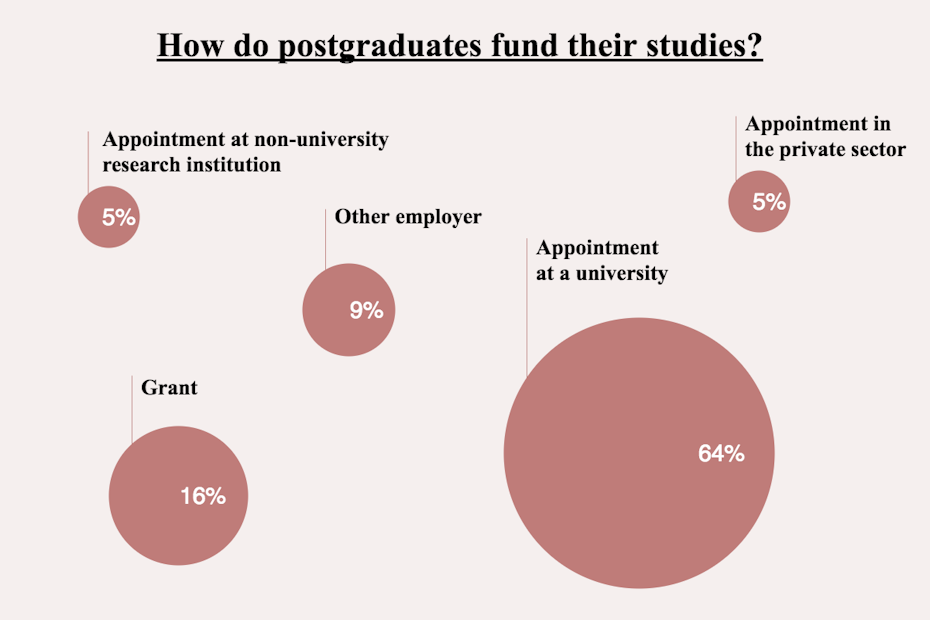
Many doctoral students want to spend a period of time abroad, as this is required in many scientific professions. Others are awarded a scholarship and finance themselves or take a break from their doctorate if they are offered a good job in the private sector. Some things should be kept in mind with regard to the experience level: Employment contracts at foreign universities and research institutions are generally recognised automatically. However, more caution should be taken with scholarships, even if the scholarship is affiliated with an institute and the same work is performed as employed researchers. This time may be included in the duration spent at each stage, but this is not necessarily always the case. After all, this time is considered "beneficial" rather than a "detrimental interruption". The latter is the case, for example, when a doctorate student enters the private sector for several years to continue their doctorate studies there. Only professional experience gained with a public employer is considered relevant. If such an interruption lasts more than three years, the employee may even be punished when returning to public service by downgrading them to a lower experience level. On the other hand, this does not apply to postgraduates on maternity leave or paid leave. This is also true of incapacity for work up to a maximum of 39 weeks. Time spent at the particular stage is still counted in such cases. Parental leave, however, is considered to be an interruption and is not counted for transition to the next experience level.
Postgraduates who hold a PhD position at a research institution receive and annual special payment, like all other employees in the civil service. This varies depending on the collective agreement and tariff area (East or West), but ranges between 33 and 60% of the average gross salary. Postgraduates who already have children and are paid on the basis of the TV-H, which is only valid in Hessen, will also benefit from a child supplement. The collective agreements also allow for additional compensation for services rendered, such as special services associated with the acquisition of third-party funds. However, there is no standard practice among the federal states and the various institutions.
Doctoral position on ultrafast charge and exciton processes in organic semiconductors (f/m/x)

Research Assistant/Doctoral Student (f/m/d) - Chair of Logistics and Services Management

12 Stellen zur Promotion als Wissenschaftliche:r Mitarbeiter:in

Related articles

Those who do a doctorate improve their chances on the work market. Are you considering to be a PhD student in Germany? Here's everything you need to know – requirements, options, duration and process.

Research is gaining more and more importance for Germany as an industrial location. Where does research take place, what are the most important research fields, and what opportunities does Germany offer international researchers?

Doctorates following the traditional model still make up the majority of PhDs in Germany compared to structured programmes. For doctoral candidates from abroad, a traditional PhD requires a great deal of initiative, autonomy and tenacity.

The tariff structure for academic salaries is extremely transparent in Germany – a refreshing approach given the many different payment models in academia. Here, we provide an overview of the scales commonly seen in Germany.
- home
- wire - news in brief
- search for a job in research and innovation
- ☕ publish a job offer on jobs.myScience
- other job markets
- how to apply for a job
- phd in germany
- postdoc in germany
- professorship in germany
- profile of germany
- working conditions in germany
- daily life in germany
- salary of researchers in germany
- insurances in Germany
- taxes in germany
- search an event related to science and research
- announce an event on events.myScience
- funding of research projects
- scientific information
- administration
- associations
- distance universities
- industrial research
- information
- medical research
- private universities
- private universities of applied sciences
- research associations
- research institutions
- universities
- universities of applied sciences
- universities of education

phd candidate salaries in germany
Calculated on the basis of a full-time position, doctoral students receive between 46,000 and 56,000 euros gross per year, depending on how much experience the doctoral student already has. It should be noted that an employment contract often only covers 50% of the positions.
- The tariff structure for the salary of scientists and scholars in Germany is very transparent. If a doctoral student is a research assistant at a state university or research institution, he/she is automatically a public sector employee and his/her salary is therefore regulated by a collective agreement.
- Depending on the institution, this is either the Collective Agreement for the Public Sector (TVöD) or the Collective Agreement for the Public Sector of the Länder (TV-L). These collective agreements are renegotiated every one or two years.
- All state universities, universities of applied sciences and research institutes thus pay comparable wages. As government-funded research organisations, the Max Planck Society, the Fraunhofer Society and the Helmholtz Association also follow the regulations of the collective agreement for the public sector with regard to employment, pay and social benefits.
- Doctoral students are classified in the lowest salary group E13 for scientists. Since salary group 13 has a very wide range (from newly started doctoral students to experienced postdocs), the salary groups are differentiated according to experience levels. Since 2018, all public sector wage agreements have differentiated between six experience levels, each with increasing duration.
- Doctoral students starting at experience level 1 should therefore make sure that their contract runs for at least 12 months, as employment contracts of less than one year are not considered relevant professional experience. In the event of a new position, you will be re-grouped in experience level 1, regardless of the length of time you have already worked at that level. This is true even if the change of contract is made seamlessly at the same institution. The problem, however, is that employment contracts at universities are often limited to a very short term. Around half of the contracts of academic staff in the doctoral phase are shorter than 12 months.
- The Federal Report on Young Academics and Scientists of the Federal Ministry of Education and Research of 2017 points out that the average monthly net income of doctoral students is 1,261 euros per month. This is at the lowest end of the official standard salaries.
Salaries of doctoral students in Euro per month according to collective agreements, July 2020 the salaries are based on 100% employment
Source: academics.de, public service.info
> Finding a job in research and science
Jobmail & Alerts
Last job offers
Search for job
- » Recruit new employees on jobs.myScience
PhD Handbook
PhD Stipend in ...
PhD Stipend in Germany: How to Find a Good Job In Germany After PhD?

All countries offer financial support to PhD students in their ways, but Germany takes doctoral research particularly seriously. German PhD funding takes numerous forms, reflecting the diverse ways you can complete a PhD in Germany. The PhD programs in the country are well structured and have a practice-oriented curriculum, giving students a chance to learn the subject from the grassroots level.

The popular PhD programs in Germany are mathematics, computer science, physics, economics and engineering. International students have the flexibility to complete their PhD thesis in English and join their field of work without hassle. Also, Doctoral students are often supported by traditional academic scholarships and fellowships, but German universities and research institutes offer salaried assistantships for their PhD researchers. Based on a full-time position, doctoral students accept between 46,000 and 56,000 EUR gross per year ((INR 36,61,472 to INR 44,57,444), depending on how much experience the doctoral student already has.
PhD Stipend in Germany For International Students
International students can apply for internships during and after the degree. While pursuing a degree course, you can apply for internships at the university itself as an assistant to the professor or research assistant at the lab. Here we have presented some of the important points regarding PhD student stipend in Germany:
- International students pursuing a PhD in German universities receive a monthly stipend. The average stipend for PhD students in Germany is 24,500 EUR/year (INR 19,53,189/year approximately).
- Besides being a PhD student, one can intern at public and private organisations with an average stipend of 500 EUR/month (INR 39,848/month approximately).
- Doctoral students starting at entry experience level should validate that their bond runs for at least 12 months, as employment agreements of less than 1 year are not measured as relevant professional experience.
Suggested: Types of Universities in Germany

Job & Salary After PhD in Germany
After completion of the PhD, the salary of a student is determined by several factors. These important factors are industry, years of experience, candidate’s skills and the job position. We have listed down some of the job positions offered to PhD graduate students in Germany with their average annual salaries -
High Paying Jobs In Germany
There are various high paying jobs in Germany that are offered to international students after completing their Phd course from top universities.
Suggested: Part Time Jobs for Students
Top Recruiters & Salary After PhD in Germany
Depending on a student's level of knowledge and years of experience, a plethora of job opportunities will come for a PhD graduate. Some of the important industries in Germany that offer placements to PhD students are as follows:
Suggested: Studying In Germany!
How to Find a Job After PhD in Germany?
The top cities in Germany attract a lot of PhD graduate students for their lucrative job market. Let’s look at the top cities in the country for international students.
- Berlin, the capital of Germany is known to offer jobs in the marketing sector.
- Frankfurt is a hub for the financial sector
- Munich is known for its automobile industry
Since Germany has a skilled labour shortage of more than 400,000 people, PhD graduates can conveniently get a job in Germany. Here is how international students can find jobs in Germany post degree completion -
1. Public German Job Sites
The Federal Employment Agency is one of the largest recruiting service providers in Germany. It has more than 700 offices in the country and has a platform named “International Placement Service” through which international students can find work. Make a profile on their website and mention your qualifications to get matched with a job position.
2. Private German Job Sites
There are several websites through which PhD graduate students can search for specialised jobs.
- Academics is a website where students can look for research-related work
- Jobware for vacancies in the field of management
- Staufenbiel and Stepstone for internships and graduate jobs
- Students can also check Jobooh for working in startups.
3. German Recruitment Agencies
International students who have completed their PhH course from German universities can also look for a job position in "German Yellow Pages" which has an employment section named ‘Arbeitsvermittlung’ dedicated to recruiting agencies. If the recruiting agencies are a member of the Federal Employer’s Association of Personnel Service Providers, then they can be trusted for international students.
4. German Newspapers
For academic and governmental jobs, look through the job sections in the Sunday editorials of the following newspapers -
- Frankfurter Allgemeine Zeitung
It has the widest newspaper circulation in Germany and 148 more countries. It is a centre-right, liberal conservative newspaper.
- Süddeutsche Zeitung
It is one of the largest daily newspapers in Germany and is published in Munich. It is a centre-left, progressive-liberal newspaper.
It is the flagship newspaper daily of the Axel Springer publishing group and is printed in Bonn.
- Handelsblatt
It is a German-language business newspaper published by Handelsblatt Media Group. The English language version of the newspaper is known as Handelsblatt Global Edition.
Germany is one of the top 3 countries in the world to welcome more than 30,000 students in their PhD programs. The comprehensiveness of the PhD courses helps in the overall development of students and makes them job-ready. Wondering how to apply to the best universities for a PhD? Subscribe to Yocket Premium and get one-on-one personalised guidance on the admission and scholarship process.
Frequently Asked Questions About Germany PhD Stipend
What is the PhD student salary in Germany after tax?
Usually, student stipend in Germany is tax-free when it is awarded from public sources like public universities or government scholarships. However, if you are doing internships at laboratories and private institutions, the average PhD student salary in Germany after tax is about 24,500 EUR per year (INR 19,53,189 per year approximately).
How can I work in Germany after PhD?
In order to work in Germany after your PhD, you will require a residence permit and a German work visa/employment permit. To apply for a Blue Card or work permit, you must have a job offer of 45,000 EUR/year (INR 35,87,490 approximately) before taxes.
Does the average PhD stipend in Germany increase?
The average PhD stipend in Germany per month is 2500 EUR (INR 99,305 approximately). The PhD fellowship stipend will be increased at the start of every academic year.
What are the top academic jobs in Germany after a PhD?
The top academic jobs in Germany after PhD are that of professors, lecturers, scientists and researchers. The average PhD stipend in Germany for these jobs is between 60,000 EUR to 75,000 EUR per year (INR 47,83,320 to INR 59,79,150 approximately) depending on the candidate’s experience.
What are the top non-academic jobs in Germany after a PhD?
The top non- academic jobs in Germany after PhD are that of an actuary, data analyst, operation analyst, business analyst and product developer. The average PhD stipend in Germany for these jobs is between 68,000 EUR to 80,000 EUR per year (INR 54,21,096 to INR 63,77,760 approximately).

Articles you might like
Top Streams
- Data Science Courses in USA
- Business Analytics Courses in USA
- Engineering Courses in USA
- Tax Courses in USA
- Healthcare Courses in USA
- Language Courses in USA
- Insurance Courses in USA
- Digital Marketing Courses in USA
Top Specialization
- Masters in Data Analytics in USA
- Masters in Mechanical Engineering in USA
- Masters in Supply Chain Management in USA
- Masters in Computer Science in USA
- MBA in Finance in USA
- Masters in Architecture in USA
Top Universities
- Cornell University
- Yale University
- Princeton University
- University of California Los Angeles
- University of Harvard
- Stanford University
- Arizona State University
- Northeastern University
- Project Management Courses in Australia
- Accounting Courses in Australia
- Medical Courses in Australia
- Psychology Courses in Australia
- Interior Designing Courses in Australia
- Pharmacy Courses in Australia
- Social Work Courses in Australia
- MBA in Australia
- Masters in Education in Australia
- Masters in Pharmacy in Australia
- Masters in Information Technology in Australia
- BBA in Australia
- Masters in Teaching in Australia
- Masters in Psychology in Australia
- University of Melbourne
- Deakin University
- Carnegie Mellon University
- Monash University
- University of Sydney
- University of Queensland
- RMIT University
- Macquarie University
- Data Science Courses in Canada
- Business Management Courses in Canada
- Supply Chain Management Courses in Canada
- Project Management Courses in Canada
- Business Analytics Courses in Canada
- Hotel Management Courses in Canada
- MBA in Canada
- MS in Canada
- Masters in Computer Science in Canada
- Masters in Management in Canada
- Masters in Psychology in Canada
- Masters in Education in Canada
- MBA in Finance in Canada
- Masters in Business Analytics in Canada
- University of Toronto
- University of British Columbia
- McGill University
- University of Alberta
- York University
- University of Calgary
- Algoma University
- University Canada West
- Project Management Courses in UK
- Data Science Courses in UK
- Public Health Courses in UK
- Digital Marketing Courses in UK
- Hotel Management Courses in UK
- Nursing Courses in UK
- Medicine Courses in UK
- Interior Designing Courses in UK
- Masters in Computer Science in UK
- Masters in Psychology in UK
- MBA in Finance in UK
- MBA in Healthcare Management in UK
- Masters in Education in UK
- Masters in Marketing in UK
- MBA in HR in UK
- University of Oxford
- University of Cambridge
- Coventry University
- University of East London
- University of Hertfordshire
- University of Birmingham
- Imperial College London
- University of Glasgow
Top Resources
- Universities in Germany
- Study in Germany
- Masters in Germany
- Courses in Germany
- Bachelors in Germany
- Germany Job Seeker Visa
- Cost of Living in Germany
- Best Universities in Germany
Top Courses
- Masters in Data Science in Germany
- MS in Computer Science in Germany
- Marine Engineering in Germany
- MS Courses in Germany
- Masters in Psychology in Germany
- Hotel Management Courses in Germany
- Masters in Economics in Germany
- Paramedical Courses in Germany
- Karlsruhe Institute of Technology
- University of Bonn
- University of Freiburg
- University of Hamburg
- University of Stuttgart
- Saarland University
- Mannheim University
- MBA in Ireland
- Phd in Ireland
- Masters in Computer Science Ireland
- Cyber Security in Ireland
- Masters in Data Analytics Ireland
- Ms in Data Science in Ireland
- Pharmacy courses in ireland
- Business Analytics Course in Ireland
- Universities in Ireland
- Study in Ireland
- Masters in Ireland
- Courses in Ireland
- Bachelors in Ireland
- Cost of Living in Ireland
- Ireland Student Visa
- Part Time Jobs in Ireland
- Trinity College Dublin
- University College Dublin
- Dublin City University
- University of Limerick
- Dublin Business School
- Maynooth University
- University College Cork
- National College of Ireland
Colleges & Courses
- Masters in France
- Phd in France
- Study Medicine in France
- Best Universities in Frankfurt
- Best Architecture Colleges in France
- ESIGELEC France
- Study in France for Indian Students
- Intakes in France
- SOP for France Visa
- Study in France from India
- Reasons to Study in France
- How to Settle in France
More About France
- Cost of Living in France
- France Study Visa
- Cost of Living in Frankfurt
- France Scholarship for Indian Students
- Part Time Jobs in France
- Stay Back in France After Masters
About Finland
- Universities in Finland
- Study in Finland
- Courses in Finland
- Bachelor Courses in Finland
- Masters Courses in Finland
- Cost of Living in Finland
- MS in Finland
- Average Fees in Finland Universities
- PhD in Finland
- Bachelor Degree in Medicine & Surgery
- MBBS Courses in Georgia
- MBBS Courses in Russia
- Alte University
- Caucasus University
- Georgian National University SEU
- David Tvildiani Medical University
- Caspian International School Of Medicine
- Asfendiyarov Kazakh National Medical University
- Kyrgyz State Medical Academy
- Cremeia Federal University
- Bashkir State Medical University
- Kursk State Medical University
- Andijan State Medical Institute
- IELTS Syllabus
- IELTS Prepration
- IELTS Eligibility
- IELTS Test Format
- IELTS Band Descriptors
- IELTS Speaking test
- IELTS Writing Task 1
- IELTS score validity
- IELTS Cue Card
IELTS Reading Answers Sample
- Animal Camouflage
- Types Of Societies
- Australia Convict Colonies
- A Spark A Flint
- Emigration To The Us
- The History Of Salt
- Zoo Conservation Programmes
- The Robots Are Coming
- The Development Of Plastic
IELTS Speaking Cue Card Sample
- Describe A Puzzle You Have Played
- Describe A Long Walk You Ever Had
- Describe Your Favourite Movie
- Describe A Difficult Thing You did
- Describe A Businessman You Admire
- Memorable Day in My Life
- Describe Your Dream House
- Describe A Bag You Want to Own
- Describe a Famous Athlete You Know
- Aquatic Animal
IELTS Essay Sample Sample
- Best Education System
- IELTS Opinion Essay
- Agree or Disagree Essay
- Problem Solution Essays
- Essay on Space Exploration
- Essay On Historical Places
- Essay Writing Samples
- Tourism Essay
- Global Warming Essay
- GRE Exam Fees
- GRE Exam Syllabus
- GRE Exam Eligibility
- Sections in GRE Exam
- GRE Exam Benefits
- GRE Exam Results
- GRE Cutoff for US Universities
- GRE Preparation
- Send GRE scores to Universities
GRE Exam Study Material
- GRE Verbal Preparation
- GRE Study Material
- GRE AWA Essays
- GRE Sample Issue Essays
- Stanford University GRE Cutoff
- Harvard University GRE Cutoff
- GRE Quantitative Reasoning
- GRE Verbal Reasoning
- GRE Reading Comprehension
- Prepare for GRE in 2 months
Other Resources
- Documents Required For Gre Exam
- GRE Exam Duration
- GRE at Home
- GRE vs GMAT
- Improve GRE Verbal Scores
Free GRE Ebooks
- GRE Preparation Guide (Free PDF)
- GRE Syllabus (Free PDF)
- GMAT Eligibility
- GMAT Syllabus
- GMAT Exam Dates
- GMAT Registration
- GMAT Exam Fees
- GMAT Sections
- GMAT Purpose
GMAT Exam Study Material
- How to prepare for GMAT?
- GMAT Score Validity
- GMAT Preparation Books
- GMAT Preparation
- GMAT Exam Duration
- GMAT Score for Harvard
- GMAT Reading Comprehension
- GMAT Retake Strategy
Free GMAT Ebooks
- GMAT Guide PDF
- Download GMAT Syllabus PDF
- TOEFL Exam Registration
- TOEFL Exam Eligibility
- TOEFL Exam Pattern
- TOEFL Exam Preparation
- TOEFL Exam Tips
- TOEFL Exam Dates
- Documents for TOEFL Exam
- TOEFL Exam Fee
TOEFL Exam Study Material
- TOEFL Preparation Books
- TOEFL Speaking Section
- TOEFL Score and Results
- TOEFL Writing Section
- TOEFL Reading Section
- TOEFL Listening Section
- TOEFL Vocabulary
- Types of Essays in TOEFL
Free TOEFL Ebooks
- TOEFL Exam Guide (Free PDF)
- PTE Exam Dates
- PTE Exam Syllabus
- PTE Exam Eligibility Criteria
- PTE Test Centers in India
- PTE Exam Pattern
- PTE Exam Fees
- PTE Exam Duration
- PTE Exam Registration
PTE Exam Study Material
- PTE Exam Preparation
- PTE Speaking Test
- PTE Reading Test
- PTE Listening Test
- PTE Writing Test
- PTE Essay Writing
- PTE exam for Australia
Free PTE Ebooks
- PTE Syllabus (Free PDF)
- Duolingo Exam
- Duolingo Test Eligibility
- Duolingo Exam Pattern
- Duolingo Exam Fees
- Duolingo Test Validity
- Duolingo Syllabus
- Duolingo Preparation
Duolingo Exam Study Material
- Duolingo Exam Dates
- Duolingo Test Score
- Duolingo Test Results
- Duolingo Test Booking
Free Duolingo Ebooks
- Duolingo Guide (Free PDF)
- Duolingo Test Pattern (Free PDF)
NEET & MCAT Exam
- NEET Study Material
- NEET Preparation
- MCAT Eligibility
- MCAT Preparation
SAT & ACT Exam
- ACT Eligibility
- ACT Exam Dates
- SAT Syllabus
- SAT Exam Pattern
- SAT Exam Eligibility
USMLE & OET Exam
- USMLE Syllabus
- USMLE Preparation
- USMLE Step 1
- OET Syllabus
- OET Eligibility
- OET Prepration
PLAB & LSAT Exam
- PLAB Exam Syllabus
- PLAB Exam Fees
- LSAT Eligibility
- LSAT Registration
- TOEIC Result
- Study Guide
Application Process
- LOR for Masters
- SOP Samples for MS
- LOR for Phd
- SOP for Internship
- SOP for Phd
- Check Visa Status
- Motivation Letter Format
- Motivation Letter for Internship
- F1 Visa Documents Checklist
Career Prospects
- Popular Courses after Bcom in Abroad
- Part Time Jobs in Australia
- Part Time Jobs in USA
- Salary after MS in Germany
- Salary after MBA in Canada
- Average Salary in Singapore
- Higher Studies after MBA in Abroad
- Study in Canada after 12th
Trending Topics
- Best Education System in World
- Best Flying Schools in World
- Top Free Education Countries
- Best Countries to Migrate from India
- 1 Year PG Diploma Courses in Canada
- Canada Vs India
- Germany Post Study Work Visa
- Post Study Visa in USA
- Data Science Vs Data Analytics
- Public Vs Private Universities in Germany
- Universities Vs Colleges
- Difference Between GPA and CGPA
- Undergraduate Vs Graduate
- MBA in UK Vs MBA in USA
- Degree Vs Diploma in Canada
- IELTS vs TOEFL
- Duolingo English Test vs. IELTS
- Why Study in Canada
- Cost of Living in Canada
- Education System in Canada
- SOP for Canada
- Summer Intake in Canada
- Spring Intake in Canada
- Winter Intake in Canada
- Accommodation in Canada for Students
- Average Salary in Canada
- Fully Funded Scholarships in Canada
- Why Study in USA
- Cost of Studying in USA
- Spring Intake in USA
- Winter Intake in USA
- Summer Intake in USA
- STEM Courses in USA
- Scholarships for MS in USA
- Acceptable Study Gap in USA
- Interesting Facts about USA
- Free USA course
- Why Study in UK
- Cost of Living in UK
- Cost of Studying in UK
- Education System in UK
- Summer Intake in UK
- Spring Intake in UK
- Student Visa for UK
- Accommodation in UK for Students
- Scholarships in UK
- Why Study in Germany
- Cost of Studying in Germany
- Education System in Germany
- SOP for Germany
- Summer Intake in Germany
- Winter Intake in Germany
- Study Visa for Germany
- Accommodation in Germany for Students
- Free Education in Germany
Country Guides
- Study in UK
- Study in Canada
- Study in USA
- Study in Australia
- SOP Samples for Canada Student Visa
- US F1 Visa Guide for Aspirants
Exams Guides
- Duolingo Test Pattern
Recommended Reads
- Fully Funded Masters Guide
- SOP Samples For Australia
- Scholarships for Canada
- Data Science Guide
- SOP for MS in Computer Science
- Study Abroad Exams
- Alumni Connect
- Booster Program
- Scholarship
GPA CALCULATOR Convert percentage marks to GPA effortlessly with our calculator!
Expense calculator plan your study abroad expenses with our comprehensive calculator, ielts band calculator estimate your ielts band score with our accurate calculator, education loan calculator discover your eligible loan amount limit with our education calculator, university partner explore growth and opportunities with our university partnership, accommodation discover your perfect study abroad accommodation here, experience-center discover our offline centers for a personalized experience, our offices visit us for expert study abroad counseling..
- 18002102030
- Study Abroad
PhD in Germany: All You Must Know
- German Universities
Updated on 10 April, 2024

Urvi Agrawal
Germany has become an increasingly popular study destination for PhD students worldwide. Every year, 28,000 students complete their doctoral degrees in Germany, significantly more than in any other European Union country.
With numerous prestigious universities, exceptional research facilities, and low or no tuition fees at public universities, Germany offers an attractive path to a PhD. Let’s learn more about PhD in Germany.
Table of Contents
Key highlights, international focus, high living standard at low-cost, exceptional research, freedom to explore your potential, funding opportunities, phd in germany: subjects and specialization, phd in germany admission requirements, phd in germany: document checklist, cost of phd in germany, living expenses in germany, scholarships for phd in germany, salary after phd in germany, why study phd in germany.
A PhD in Germany for Indian students offers several advantages:
About 5,800 international students finish doctorates in Germany yearly, showing it attracts talent worldwide. Notably, English is the primary language of many PhD programs, providing accessibility and inclusivity to international scholars as they can write their PhD thesis in English.
Despite affordable costs, Germany offers a high standard of living, making it attractive for doctoral studies. Public universities charge low or no tuition fees for doctoral programs, easing the financial burden of students.
Germany boasts a strong academic environment and offers an excellent scientific culture with an investment of around 121 billion euros in its research and development sectors. Thus, aspirants will be at the forefront of cutting-edge research.
PhD students in Germany benefit from a supportive and free environment valuing creativity. Moreover, as a PhD student in Germany, you will get to travel to other countries in the European Union for your research, providing ample opportunities for networking and professional growth.
Germany offers extensive funding for promising doctoral candidates. Organizations like the German Academic Exchange Service support 4000+ international doctoral students annually through scholarships. With a good academic record and compelling research proposals, prospective PhD students stand a strong chance of securing financial assistance to pursue their higher studies in Germany.
In Germany, students can pursue their PhD studies in a wider range of subjects or academic disciplines. From the liberal arts to biology, prospective PhD students can explore different fields. Here are ten specializations for PhD programs in Germany.
- Medicine and Health
- Engineering and Design
- Life Sciences
- Natural Sciences
- Social Sciences and Technology
- Computer, Information, and Technology
- Environmental Health
- Historical Studies
PhD in Germany: Admissions
Getting accepted into PhD programs in Germany involves adhering to specific guidelines and completing essential documentation. Understanding the requirements and compiling the necessary paperwork are crucial steps for individuals aspiring to pursue doctoral studies in Germany.
Here are the admission requirements and document checklists:
The requirements for admission to PhD programs in Germany for international students may differ depending on the university and the discipline. Here are the general requirements for admission to PhD programs.
- Applicants are required to possess either a master's degree (MSc) or a Diploma from a German university or a recognized institution. In rare cases, a bachelor's degree (BSc) with honors, equivalent to a 4-year program that includes a thesis, will be considered. Students must have obtained a minimum average grade of 2.5 or equivalent.
- English proficiency proof, such as the TOEFL or IELTS, is strongly recommended unless the applicant is a native speaker, or possesses an educational background in English, or has completed six months of study in an English-speaking institution. Usually, an IELTS score of 6.5 and a TOEFL score of 95 are required.
- You will also have to submit your GRE/GMAT scores if required by the university.
- International students also need to show a minimum of €11,208 per year in their blocked account to obtain a German visa.
Applicants for PhD positions in Germany are generally required to submit a comprehensive set of documents, but the specific requirements may vary depending on the specialization and university. The general documents required are:
- Letter of Application
- Curriculum Vitae (CV)
- Academic Certificates (including graduate and post-graduate)
- Motivation Letter or SOP
- Language Proficiency Proof
- Minimum two Recommendation Letters
- Passport Copy
- Portrait Picture
- GRE/GMAT subject scores
In Germany, students can pursue doctoral studies at public universities with low or no tuition fees. However, you will still need to submit a "semester contribution" every semester, which is essential for financing student services.
This amount varies depending on the university you choose, though it usually varies from €100 to €350. However, private institutions may still charge for their PhD programs. The fees can vary from €2,000–€2,280 per year.
Living expenses, covering accommodation, transportation, and food, are essential for a standard lifestyle. In Germany, these costs are moderate compared to other European nations. They are also generally lower than in Denmark, Luxembourg, or Switzerland.
A student in Germany can expect to spend around €842 monthly. Thus, planning your budget before reaching the country is crucial to manage your finances well.
Here is the average cost of living in Germany for international students:
Source: DAAD (German Academic Exchange Service)
Germany offers a number of merit-based and need-based scholarships to meritorious students across the globe. Below is a comprehensive list of various PhD scholarships available in the country with their details:
Here is a table outlining different roles after a PhD in Germany, along with their expected salaries:
Source: Glassdoor(as of March 2024)
Pursuing a PhD in Germany can pave the way for an enriching and lucrative academic career for students who are passionate about research. Thus, the prospect of living in a vibrant nation with cutting-edge infrastructure makes Germany an ideal destination for a PhD.
Discover More:
- Why study in Germany
- Cost of Study in Germany
- Career Opportunities in Germany
- Scholarships in Germany for Indian students
- Requirements for study in Germany for Indian Students

MBA General Management-90 ECTS
International School of Management, Germany

Master in International Management

Master of Business Administration (60 ECTS)

M.Sc. Business Intelligence & Data Science

Master of Business Administration (90 ECTS)
Are there any tuition fees for phd in germany for indian students.
Indian students pursuing a PhD in Germany do not have to pay tuition. Public universities do not charge fees for PhD study, and this includes all international students. Some private universities may charge fees, but fellowship funding or support often covers costs.
Can I pursue a PhD in Germany if I don't speak German?
While knowing German can be helpful, it is not absolutely necessary. Many colleges in Germany currently provide classes taught in English to welcome international students. When pursuing a PhD, candidates often have the flexibility to choose between writing their thesis in English or German.
What are the types of PhD in Germany?
In Germany, doctoral studies offer two primary options: the individual doctorate and structured PhD programs. The individual PhD option includes self-directed research under the guidance of a single professor, while structured programs featuring collaborative supervision and shared coursework. Structured programs may provide funding or stipends, whereas the individual pathway remains the conventional preference for most doctoral candidates in Germany.
Urvi has 3 years of experience as a content writer and marketer. Over years, she has established herself as a study-abroad expert and is adept at crafting compelling and engaging content for students. Self-driven and passionate professional, she likes writing poetry and has authored a poetry book ‘Thoughts of a Wallflower’.
Exams to Study Abroad
Top study abroad destinations, important resources, get free consultation, similar articles.


Higher pay for doctoral researchers
Max Planck funding contracts remunerated according to the DFG funding rates since 1 January 2021
What had been prepared over a long period of time has finally come to fruition: the Joint Science Conference (GWK - Gemeinsame Wissenschaftskonferenz ) has granted the Max Planck Society its approval to apply the DFG-German Science Foundation’s gold standard in compensation for doctoral researchers. The new contract details were published on December 14, 2020 within the Max Planck Society's Organisational Manual (OHB).

Whether in the library, lab, or in field work - in future, all doctoral students will be paid at least 65 per cent of TVöD 13.
© Stígur Már Karlsson / Heimsmyndir / istock
As of January 1, 2021, all doctoral researchers with Max Planck funding contracts will be compensated according to the DFG’s funding rates. This applies to both new and already running contracts, which will be adjusted accordingly. If there are delays in signing contracts due to home office regulations caused by the Covid-19 pandemic, for example, the regulation and payment will be applied retroactively. In addition, institutions may also set higher basic salaries to reflect subject-specific remuneration. The possibility of individual recruitment boni will remain unaffected by the new regulation.
The new regulation will apply to all Max Planck Institutes throughout Germany, as well as the Netherlands and Italy. The Institutes are expected to cover the increased costs for their own doctoral researchers from their local budgets.
"Currently centrally funded Max Planck Research Groups, which are in particular open-topic Max Planck Research Groups, Lise Meitner Groups, Minerva Max Planck Research Groups as well as Otto Hahn Groups, however, receive an annual grant of 7,500 euros per group. The same is provided for the ongoing, so-called institute-based Max Planck Research Groups. International Max Planck Research Schools receive a one-time grant," adds Ilka Schießler-Gäbler from the Department of Human Resources Development and Opportunities at the Administrative Headquarters in Munich.
"The new contract regulations are a great step forward as they will not only ease the financial situations of PhD students, but also bring more equality to the salaries of doctoral researchers because they reduce the Section- and gender-specific pay gaps – a discrepancy which was also reflected within the last PhDnet surveys", said Lea Heckmann, the new PhDnet spokesperson of 2021. "We're very pleased that this milestone of improving the situation for doctoral students has now been reached. We're very grateful to the many generations of PhDnet steering committees who have driven this project, as well as the staff at the MPG’s Administrative Headquarters and the General Secretary Rüdiger Willems, who have been instrumental in paving the way for this progress", summarized former PhDnet spokesperson Lindsey Bultema.
Other Interesting Articles

“It’s a challenge we need to be tackling right now”
Positive developments in the representation of female scientists across various stages of scientific careers

Support project for students in Turkey and Syria in earthquake-affected regions
MAXminds Mentorship initiative to aid affected university students in their careers

Prestigious ERC funding for 20 Max Planck researchers
The European Research Council (ERC) awards 20 Starting Grants to the Max Planck Society, ten of them to female researchers
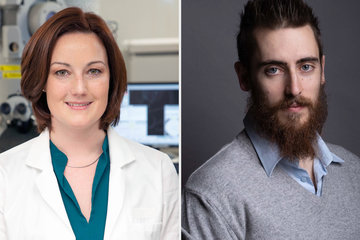
Doubly successful
The German Research Foundation recognizes Bonnie J. Murphy and Giulio Malavolta with the Heinz Maier-Leibnitz Prize
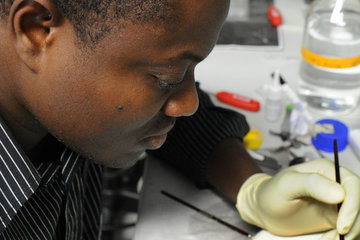
Max Planck Humboldt Programme in Africa
Support for research locations in African countries
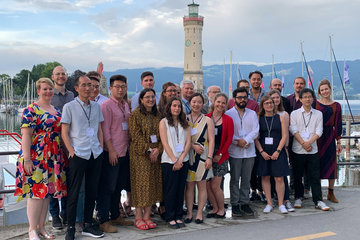
Meeting point Lindau
After two years of online only encounters, the Lindau Nobel Laureate Meeting 2022 took place onsite again

“We need a cultural change to remain competitive”
Asifa Akhtar is Vice President of the Max Planck Society and head of the Max Planck Presidential Commission on Equal Opportunities. In this interview, she talks about her engagement for a cultural change towards more diversity and inclusion at the Max Planck Society. A plea to dare more diversity and inclusion.
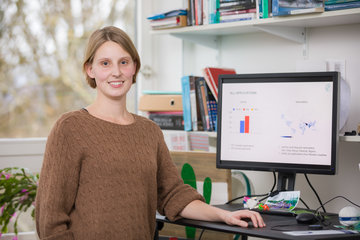
Opening doors for equal opportunities
PhD student Franziska Bröker from the Max Planck Institute for Biological Cybernetics initiated the CaCTüS Internship programme for less advantaged students

Living diversity - but how?
How do you successfully develop a long-term strategy for a diverse and inclusive culture? The MPI for Psycholinguistics has set up a local working group to tackle this challenge

Positive Interim Evaluation of the Max Planck Schools
From December 2020 to April 2021, a panel of experts led by Prof. Karl Max Einhäupl, former chairman of the German Council of Science and Humanities and former CEO of Charité Universitätsmedizin Berlin, conducted an evaluation of the Max Planck Schools
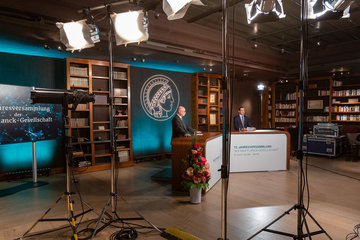
Digital Annual Meeting of the Max Planck Society 2021
The Max Planck Society's members and committees are meeting digitally again for their Annual Meeting
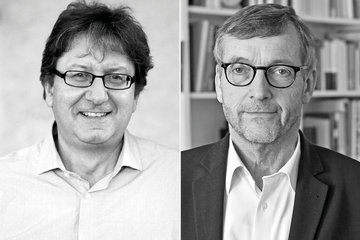
Max Planck Schools expand network of Fellows
As of October 01, 2021 onwards, 120 Fellows reappointed and 14 newly appointed
Notification Settings
PhD in Germany: Universities, Fees, Application & More!
Link Copied
Share on Facebook
Share on Twitter
Share on LinkedIn
.webp)
From an aspirant to a scholar
Germany has become the most sought-after destination to pursue a PhD given the affordability, style of living and, of course, a plethora of job opportunities. To help you make an informed decision, we have curated a complete guide on PhD in Germany for international students that talks about top universities, costs, courses, student life and many more aspects!
Why Study PhD in Germany?
Germany is popularly known for boasting a rich academic tradition and hosts several reputed universities. With renowned research institutions, efficient and top-notch education systems, along with a vibrant academic community, it offers a conducive environment for studying PhD in Germany. Here are some of the major reasons why students should consider pursuing PhD programs in Germany for international students.
1. Quality of Education
Germany has emerged as a well-reputed university that is popular globally. German universities have a long tradition of contributing to excellent research and Nobel laureates to the rest of the world. The German universities award around 5,800 doctoral degrees every year to international scholars.
2. Academic Eligibility
To get admission for PhD in Germany, it is not mandatory to have a master’s degree. Students who possess a bachelor’s degree in a relevant field can also apply for PhD programs in Germany. However, the students must have an excellent academic record.
3. Fully Funded PhD Programs
The PhD programs in Germany are fully funded by the German government. This, in turn, makes studying for a PhD in Germany free of cost.
4. Structured Programs
The PhD programs in Germany are well-structured and focused and offer a combination of coursework, research and practical experience. The PhD courses in Germany are usually 3-6 years long, depending on the specialisation.
5. Affordability
To bear the cost of living, study materials, etc, there are plenty of funding options available to support the study PhD in Germany. The most popular among them is the DAAD scholarship, which offers scholarships to 4000+ students every year.
Types of PhD in Germany
PhD in Germany is classified into two types of doctorates. After taking into consideration many aspects like qualifications, area of research, discipline, etc, students can choose which path of PhD they would like to pursue.
1. Individual Doctorate
The Individual Doctorate is the traditional path that is followed by more than three-quarters of all doctoral students in Germany. In an Individual doctorate, the research is carried out independently by the student alone under the supervision of one professor. The traditional form of PhD in Germany offers great flexibility but also demands a high percentage of initiative and responsibility. The Individual doctorate can be approximately 5-6 years long. However, the duration also depends on the student’s schedule or the work contract duration.
2. Structured PhD Programs
Distinctive to the Individual Doctorate, the researcher is supervised by a team and not just one professor. The student is also required to attend courses, lectures and seminars along with other doctoral students. Usually these structured PhD programmes are advertised publicly and also feature grants or paid doctoral programs.
Students can conduct their research at:
1. University 2. Non-University Research Institute 3. Industry
Don't let accommodation concerns distract you from pursuing your PhD dreams in Germany!
Book today with amber
Top PhD Courses in Germany
One can choose from an array of courses and specialisations to study PhD in Germany. We have listed some of the popular ones below.

1. Agricultural Science 2. Business Administration 3. Economics 4. Law 5. Social Sciences 6. Biology 7. Philosophy
Top Universities for PhD in Germany
It is very important to finalise the university you want to pursue a PhD from. Factors like the fees, faculties, curriculums and the quality of education play a crucial role in such cases. To guide you in picking the ideal university, here is a list of universities along with the fees.
Top Non-University Research Institutes for PhD in Germany
Students can obtain a PhD in Germany by conducting their research at a non-university research institute. These institutes do not have the right to award a PhD, but they collaborate with universities for the same. The non-university research institutes offer scholarships and may also offer employment contracts, which are usually fixed-term. Here are some of the top Top Non-University Research Institutes for PhD in Germany.
1. Fraunhofer-Gesellschaft 2. Helmholtz Association 3. Leibniz Association 4. Max Planck Society
Admission Requirements and Eligibility Criteria
The admission requirements usually vary depending on the university and specialisation. However, some requirements like the German student visa , transcripts etc need to be fulfilled for admission to a majority of universities.
1. German Proficiency Proof: TestDaf Level 4 2. English Proficiency Proof: IELTS 7.0 (6.5 in each band), TOEFL-iBT score between 80-100 3. GPA of 2.5 or an overall grade of B+ 4. German Student Visa 5. Overall GRE score of 160 or more 6. A degree(Diploma, Magister or Master’s) from a recognised university with an above-average aggregate score.
Application Process
For Structured PhD: The student must apply directly to the faculty and the process will be carried out through online portals.
For Traditional PhD: The applicant has to reach out to the prospective supervisor. When the supervisor agrees to work with you, they will proceed with your request to the relevant faculty. After this, the department will request a few documents that we have mentioned below.
Documents Required
The students are required to submit a few documents while registration. Make sure to keep all of the documents mentioned ready while applying for a PhD in Germany.
1. Certified copies of official transcripts 2. A letter of motivation and 2 letters of recommendation 3. English/German proficiency certificates 4. An updated resume 5. Copy of the applicant’s identification document
PhD Scholarships in Germany
Even if the PhD programs in Germany are fully funded, there are still a few costs that the students are required to pay. This is why it is advisable to look for scholarships in Germany which provide financial assistance! Here are some of the top scholarships for PhD in Germany for international students, along with the award amount.
1. TUM GS Bridge Financing Grant: €1,000/month + €150 for child and family support. 2. Heinrich Boll Scholarship: €934 3. Central Sector Scheme of National Overseas Scholarship: €30,000 4. University of Goettingen Funding: €1,100 - €1,400 or employment contract 5. DAAD Scholarships: €1,200/month 6. Deutschland Stipendium National Scholarship Programme: €300 7. Universität Hamburg Merit Scholarships: €1,000/month 8. Konrad-Adenauer-Stiftung Scholarships: €1,200/month
To increase your chances of winning the scholarship, take a look at the ultimate guide to writing a cover letter !
Cost of Living
Germany offers an affordable cost of living compared to other countries. Living alone comes with its share of challenges, and managing finances is one of the most challenging factors. In such cases, planning a monthly budget of €1,200 - €1,700/month will be of great help. Here are some of the estimates to help you plan the month.
1. Rent: €625 - €1,700/month 2. Public Transport: €60 - €80/month 3. Groceries: €150 - €170/month 4. Gas & Electricity: €200 - €250/month 5. Phone & Internet: €30 - €35/month 6. Entertainment: €10 - €15/month
Career Prospects & Average Salary for PhD Graduates
After completing the PhD in Germany, the students are exposed to the job market. The salaries the students might earn are dependent on several aspects like job position, the applicant’s skills, experience and industry. Here is a brief list of some job profiles that are offered to PhD graduates in Germany, along with their average annual salaries. Some of these are the highest-paying jobs in Germany for international students !
Pursuing a PhD in Germany for international students opens doors to golden opportunities that allow students to upskill and bag an average salary that ranges from €60,000 - €75,000 per year. The PhD programs in Germany offer expertise in writing thesis and research papers and also train students to conduct deep-rooted research. The German culture , affordability, exposure to the job market and the high quality of education compel students to pursue a doctorate in Germany.
Frequently Asked Questions
Which job profiles can i apply for after pursuing a phd in germany, where can i conduct research to pursue a phd in germany, which are the most popular phd courses in germany for international students, are there any phd scholarships in germany, what is the duration for a phd in germany.
Your ideal student home & a flight ticket awaits
Follow us on :

Related Posts

Oxford vs Harvard: Which University is Right for You?

10 Easy ChatGPT Language Learning Hacks In 2024

The Top 10 Courses in Demand in the UK in 2024!

Planning to Study Abroad ?

Your ideal student accommodation is a few steps away! Please fill in your details below so we can find you a new home!
We have got your response

amber © 2024. All rights reserved.
4.8/5 on Trustpilot
Rated as "Excellent" • 4800+ Reviews by students
Rated as "Excellent" • 4800+ Reviews by Students

Ph.D. Stipend in Germany: Things you need to know
Table of Contents

All countries provide some form of financial aid to Ph.D. students , but Germany places a premium on doctorate research. The variety of ways you can accomplish a Ph.D. in Germany is reflected in the various forms that German Ph.D. financing might take. The nation’s Ph.D. programs are well-organized and have a practice-oriented curriculum, offering students the chance to study a subject from the ground up.

In Germany, the most searched Ph.D. programs are in mathematics, computer science, physics, economics, and engineering. International students have the freedom to complete their English-language Ph.D. theses and easily transition into their chosen fields of employment. Learn more about Ph.D. scholarships .

Furthermore, conventional academic scholarships and fellowships are frequently used to support doctoral students, but German universities and research institutions also provide salary assistantships for Ph.D. researchers. Doctoral students take between 46,000 and 56,000 EUR gross ( INR 36,61,472 to INR 44,57,444 ) per year based on full-time employment, depending on the amount of prior experience the doctoral student has.
Ph.D. Stipend in Germany for International Students
Internship applications are accepted by foreign students both during and after graduation. You can apply for internships at the university as a research assistant in the lab or a professor’s assistant while enrolled in a degree program. Here, we’ve outlined some key details about the German Ph.D. student stipend:
- German institutions provide a monthly payment to international Ph.D. candidates. In Germany, Ph.D. students receive an annual income of 24,500 EUR (about INR 19,53,189).
- In addition to pursuing a Ph.D., one can work as an intern at public and commercial organizations for an average salary of 500 EUR per month (about INR 39,848 per month).
- Since employment agreements that last less than a year do not count as relevant professional experience, doctoral students with little or no experience should confirm that their bond lasts for at least 12 months.
Job & Salary After Ph.D. in Germany
The salary of a student after earning a Ph.D. is based on a number of things. Industry, years of experience, candidate talents, and job positions are among these crucial considerations. We’ve included a few of the jobs available to Ph.D. graduates in Germany along with their typical yearly salary below:
High-Paying Jobs in Germany
After finishing their Ph.D. program at a prestigious university, overseas students can apply for a number of well-paying employment in Germany.
How to Find a Job After Ph.D. in Germany?
Many Ph.D. graduate students choose to live in Germany’s major cities because of the attractive employment environment. Let’s examine the best cities in the nation for foreign students.
- Jobs in the marketing field are reportedly available in Berlin, the German capital.
- Financial industry hubs include Frankfurt.
- Munich’s car industry is well renowned.
Since there is 400,000+ people skilled labor shortage in Germany, Ph.D. grads may easily get employment there. Here are some tips for foreign students looking to work in Germany after earning their degree:
1. Open German Job Sites
One of Germany’s major providers of recruitment services is the Federal Employment Agency. It has more than 700 locations around the nation and offers an international student employment platform called “ International Placement Service. ” In order to get matched with a job vacancy, create a profile on their website and include your qualifications.
2. German private job sites
Ph.D. graduates have access to a variety of websites where they can look for specialized employment.
- Academics for openings in the management industry.
- Staufenbiel and Stepstone for graduate employment and internships.
- Students can also look up startups on Jobooh.
3. German Recruitment Companies
The “ German Yellow Pages ,” which features an employment section called “ Arbeitsvermittlung ” dedicated to recruitment agencies, is another resource for international students who have completed their Ph.D. program at German institutions and are looking for work. For international students, recruiting firms can be trusted if they are members of the Federal Employer’s Association of Personnel Service Providers.
4. Newspapers in German
Look through the employment sections in the Sunday editorials of the following newspapers for academic and government positions :
FAZ or Frankfurter Allgemeine Zeitung
It has the largest newspaper readership in 148 countries in addition to Germany. It is a liberal, conservative journal on the center-right.
Süddeutsche Zeitung
It is published in Munich and is one of the biggest daily newspapers in Germany. It is a center-left, liberal-progressive newspaper .
It is printed in Bonn and serves as the Axel Springer publishing company’s main newspaper daily.
Handelsblatt
The Handelsblatt Media Group is the publisher of this business newspaper in German. Handelsblatt Global Edition is the name of the newspaper’s English-language edition .
One of the top 3 nations in the world to accept more than 30,000 students for Ph.D. programs in Germany. The depth of the Ph.D. courses promotes students’ overall growth and prepares them for the workforce. Additionally, this aids German Ph.D. stipend recipients.
Best Christmas markets in Germany for 2022
How to find an internship in germany, 49 euro ticket-everything you need to know.
Visit our website for more articles related to studying in Germany . Follow us on Instagram and Facebook for more tips & information on studying in Germany.
Share this:
Snigdha Dalua
Where to buy sim card at berlin airport, where to buy sim card at stuttgart airport, where to buy sim card at hamburg airport, where to buy sim card at frankfurt airport, where to buy sim cards at cologne airport, videx form germany, things you need to know about partial legalization of cannabis in germany, six unmissable spring events in germany 2024, everything that changes in germany in april 2024, most-popular beauty and personal care in germany, 2 german states abolish mandatory covid-19 isolation, fun things to do at christmas time in germany, related articles.

Buy Best Shaving Set Online In Germany

Schengen Visitor Visa: Complete Guide

Best Driving Schools in Germany

Best-Selling Electric Toothbrush in Germany
FellowshipBard
Phd in germany: cost, scholarships, & admission requirements.
Have you considered pursuing a PhD in Germany? Germany is a popular destination for international students seeking a high-quality education and a vibrant research environment.
Pursuing a PhD in Germany can provide you with a unique opportunity to work with leading researchers in your field, gain valuable experience, and develop your skills.
In this article, we will explore some of the key aspects of pursuing a PhD in Germany, including the application process, funding opportunities, and the research environment.
How Much Does PhD Cost in Germany?
The cost of pursuing a PhD in Germany varies depending on several factors, including the university, the program, and the student’s lifestyle. However, most public universities in Germany offer their doctoral programs at a highly subsidized tuition or even at no tuition cost at all.
The only cost that students may have to pay is a semester fee ranging from 300-3,000 EUR a year. Private universities may charge higher tuition fees, but they are generally more expensive than public universities.
In addition to tuition fees, students will also have to consider the cost of living in Germany, which includes rent, food, transportation, and other expenses. The average cost of living in Germany is around 700-1,100 EUR per month.
Follow FellowshipBard for daily updates!
How Many Years is a PhD in Germany?
The duration of a PhD program in Germany typically ranges from 3-5 years. The duration may vary depending on the field of study, the research topic, and the student’s progress.
Who is Eligible for PhD in Germany?
To be eligible for a PhD program in Germany, applicants must meet certain requirements. Here are the general eligibility criteria for pursuing a PhD in Germany based on the search results:
- A strong research-oriented master’s degree in a relevant field of interest is a major prerequisite while applying for a PhD in Germany.
- The acknowledged degree for entering doctoral studies in Germany is a Master’s Degree – taken by completing at least eight semesters of your Master studies.
- Extremely well-qualified international applicants with a bachelor’s degree may be admitted as doctoral students via a fast-track program, which will involve taking an entrance exam and perhaps attending an interview.
- Applicants must have a good higher education degree which is equivalent to a German master’s degree.
- Applicants must have a minimum GPA of 80% from a recognized university.
- Applicants must have a valid Curriculum Vitae (CV) that mentions prior work experience, academic pursuits, etc.
- Applicants must demonstrate language proficiency in either English or German. For English, applicants must have an IELTS score of 6.5 and above or TOEFL score of 80 and above.
- For German, applicants may need to prove their proficiency in the language with a test such as DSH-2 or the Goethe certificate C2.
Best Resume Writing Services
Do you get paid to do a phd germany.
Yes, PhD students in Germany receive a salary or stipend during their studies.The amount of salary or stipend varies depending on the university, the program, and the student’s experience.
The average stipend for PhD students in Germany is around 24,500 EUR per year (approximately INR 19,53,189 per year). However, some universities may offer higher stipends depending on the field of study and the research topic.
In addition to the stipend, PhD students may also receive other benefits such as health insurance, travel grants, and conference funding.
10 Best AI Cover Letter Builders
What is top 20 universities in germany.
- Technical University of Munich
- Ludwig Maximilians University Munich
- Heidelberg University
- University of Bonn
- University of Gottingen
- University of Freiburg
- Humboldt University of Berlin
- University of Tübingen
- RWTH Aachen University
- University of Hamburg
- University of Cologne
- University of Stuttgart
- University of Frankfurt
- University of Erlangen-Nuremberg
- University of Würzburg
- University of Konstanz
- University of Mannheim
- University of Bremen
- University of Münster
- University of Duisburg-Essen
Looking For Funded PhD Programs? Click Here
What is top 10 phd scholarships in germany.
Here are some of the top PhD scholarships available for international students in Germany based on the search results:
- DAAD Scholarship (German Academic Exchange Service)
- Helmholtz Research Scholarship
- Alexander Von Humboldt Foundation Scholarships
- Heinrich Böll Foundation Scholarships
- Friedrich Ebert Foundation Scholarships
- Konrad Adenauer Foundation Scholarships
- Rosa Luxemburg Foundation Scholarships
- Hans Böckler Foundation Scholarships
- Max Planck Society Scholarships
- Einstein International Postdoctoral Fellowship
Best AI Cover Letter Builders
How to apply for a phd in the germany.
1. Find a suitable PhD program and a supervisor: The first step is to find a PhD program that matches your academic and career goals. You can search for programs on the university websites or other online platforms. Once you have identified a program, you need to find a supervisor who can guide you through your research.
2. Check the eligibility criteria: Before applying, you need to check the eligibility criteria for the program. The criteria may vary depending on the university and the program. Generally, you need to have a strong research-oriented master’s degree in a relevant field of interest, a valid Curriculum Vitae (CV), and language proficiency in either English or German.
3. Prepare the application documents: The application documents may include a CV, a copy of your degree certificate, a brief description of your doctoral research, language proficiency certificates, and letters of recommendation. You may also need to submit a research proposal, a statement of purpose, and a writing sample.
4. Submit the application: Once you have prepared the application documents, you can submit them online or by mail. The application process may involve multiple stages, and the timeline may vary depending on the program.
5. Wait for the response: After submitting the application, you need to wait for the response from the university. If your application is accepted, you will receive a confirmation letter from the university. You can use this letter to apply for a German student visa.
What is PhD Application materials in Germany?
The application materials required for a PhD program in Germany may vary depending on the university and the program. However, common application materials required:
1. Curriculum Vitae (CV): A detailed CV that mentions prior work experience, academic pursuits, research interests, and other relevant information.
2. Degree certificate: A copy of your degree certificate that proves you have completed a master’s degree or equivalent. Research proposal: A brief description of your doctoral research, including the research question, methodology, and expected outcomes.
3. Statement of Purpose (SOP): A statement that explains your motivation for pursuing a PhD, your academic and career goals, and how the PhD program aligns with your goals.
4. Language proficiency certificates: Proof of language proficiency in either English or German. For English, applicants must have an IELTS score of 6.5 and above or TOEFL score of 80 and above. For German, applicants may need to prove their proficiency in the language with a test such as DSH-2 or the Goethe certificate C2.
5. Letters of Recommendation (LOR): Letters of recommendation from professors or employers who can attest to your academic and research abilities.
6. Aptitude scores: Some universities may require aptitude scores like GRE or GMAT.
7. Exposé of the dissertation project: A detailed description of the dissertation project.
Can I work while doing PhD in Germany?
Yes, it is possible to work while doing a PhD in Germany. PhD students in Germany can work as research associates at their universities, which is usually a part-time job. The research associate job description includes research, teaching, and administrative duties. PhD students can also work outside the university.
Leave a Comment Cancel reply
Save my name, email, and website in this browser for the next time I comment.

Never Miss Any Research Opportunity! Join Our Telegram Channel

25,000+ students realised their study abroad dream with us. Take the first step today
Meet top uk universities from the comfort of your home, here’s your new year gift, one app for all your, study abroad needs, start your journey, track your progress, grow with the community and so much more.

Verification Code
An OTP has been sent to your registered mobile no. Please verify

Thanks for your comment !
Our team will review it before it's shown to our readers.

Read What Is Average Dentist Salary In US For The Year 2024
- Updated on
- Apr 26, 2024

The growth in the US healthcare sector is reaching its peak and the demand for several healthcare professionals increases day by day including skilled dentists. The specializations in dentistry these days are in high demand and well-paid at the same time. The career can provide you with an abundance of growth opportunities as well as high-end exposure in the industry. To know if the career is actually rewarding in a matter of income read the following blog and get to know in depth about the average dentist salary in US .
Learn about some Part-time jobs in USA for students
This Blog Includes:
The averages of dentist salary in us, average dentist salary in us based on experience level, average dentist salary in us based on education level, average dentist salary in us in different sectors, average dentist salary in us in different cities , average dentist salary in us compared to similar professions.
The average salary of a Dentist in the US lies in a very good and competitive salary bracket range. The average yearly pay of a Dentist is 238,300 USD which is considered a very good salary in the US
- The highest average salary of a Dentist is 371,100 USD per year
- The average lowest salary of a Dentist is 115,600 USD per year
To understand the average even better, let’s know the monthly averages of the Dentists:
- The average monthly salary is for dentists 19,858 USD
- The average highest monthly salary for dentists is 30,925 USD
- The average lowest monthly salary for dentists is 9,633 USD
Your salary as a Dentist can differ from the average mentioned above as the salary payout is highly affected by several other factors like education, experience, gender, sector of work etc.
Experience level is the controlling factor for an individual’s salary determination in all industries including dentistry. Highly experienced employees with better knowledge of the subject and practice are at an advantage of a high salary package with the level of skills and trust built over the years. A Dentist with 2 to 5 years of experience in the field can expect to earn 29% of a higher salary. The following image gives the salary over several years of experience.
The average salary of employees in any field can not be determined without considering their educational qualifications. Highly educated employees do have the scope to earn better due to their knowledge and well work efficiency that comes with increased education. In this field of dentistry, an individual with a master’s degree can earn a 30% higher salary compared to a bachelor’s level of education.
Similarly, employees with a PhD can expect an even higher income of about 22% on the income level at master’s level educational qualifications.
Read about the average Physician’s salary in USA
The average pay for all the professions in different sectors in the US is usually seen to be different. The private sector is commonly seen paying a lower salary to the employees compared to the public sector of the country. In the field of dentistry, the difference is around 6%, i.e. government sector employees earn 6% higher income comparatively.
Different cities in the country have slight differences in the average pay our. The employees are noticed earning a different salary. To know which city is best for you to work in so you can earn better the following image below gives the average pay of several cities in the US.
The salary of a dentist in the US Can be better analysed if compared with other professions in the same industry. The following is the list of different professions from the same industry and the average salary paid in them to the dentists for your reference.
Know about the several Jobs in USA for Indians
Yes, the profession is in high demand, highly rewarding and comes with an abundance of growth opportunities despite the competition. You can expect to have a comfortable and stable life in this profession.
The difference of gender in the workplace in certain factors like the salary pay still face differences. The women employees in the profession of a dentist earn a 5% lower salary compared to men in the same profession.
The average pay raise in the profession of a dentist can be expected to be around 8% but the increment is completely dependent on the employee’s performance throughout the year and the employers will.
This was all about the Average Dentist Salary in US. To read more such informative blogs on jobs and salary-related topics, follow Jobs Abroad . To learn about studying abroad, follow Leverage Edu . Comment below for any suggestions or doubts.
Relevant Reads:
Anmol Makhija
Content Writer at Leverage Edu with expertise in Blog writing, publishing and editing. write best about Infotainment and Study abroad.
Leave a Reply Cancel reply
Save my name, email, and website in this browser for the next time I comment.
Contact no. *

Connect With Us
25,000+ students realised their study abroad dream with us. take the first step today..

Resend OTP in

Need help with?
Study abroad.
UK, Canada, US & More
IELTS, GRE, GMAT & More
Scholarship, Loans & Forex
Country Preference
New Zealand
Which English test are you planning to take?
Which academic test are you planning to take.
Not Sure yet
When are you planning to take the exam?
Already booked my exam slot
Within 2 Months
Want to learn about the test
Which Degree do you wish to pursue?
When do you want to start studying abroad.
January 2024
September 2024
What is your budget to study abroad?

How would you describe this article ?
Please rate this article
We would like to hear more.
Have something on your mind?

Make your study abroad dream a reality in January 2022 with
India's Biggest Virtual University Fair

Essex Direct Admission Day
Why attend .

Don't Miss Out

IMAGES
VIDEO
COMMENTS
Junior professors, like all German professors, are paid according to the W-Besoldung salary table. This scale dictates base salaries according to which state the university is in. Unlike the PhD and postdoc pay scale, there are no pay grades within this scale. A W1 professor will make minimum €4,713-€5,301 per month.
Postgraduates who hold a PhD position at a research institution receive and annual special payment, like all other employees in the civil service. This varies depending on the collective agreement and tariff area (East or West), but ranges between 33 and 60% of the average gross salary.
phd candidate salaries in germany. Calculated on the basis of a full-time position, doctoral students receive between 46,000 and 56,000 euros gross per year, depending on how much experience the doctoral student already has. It should be noted that an employment contract often only covers 50% of the positions.
The average salary for a PhD is €48,500 per year in Germany. Salaries estimates are based on 43 salaries submitted anonymously to Glassdoor by a PhD employees in Germany. What is the highest salary for a PhD in Germany?
Job & Salary After PhD in Germany. After completion of the PhD, the salary of a student is determined by several factors. These important factors are industry, years of experience, candidate's skills and the job position. ... However, if you are doing internships at laboratories and private institutions, the average PhD student salary in ...
Salary After PhD in Germany. Here is a table outlining different roles after a PhD in Germany, along with their expected salaries: Job Role. Average Annual Salary. University Professor. €69K-€100K. Research group leader. €60K-€79K. Junior professor. €55K-€71K.
The estimated salary for a PhD Students is €2,200 per month in the Germany area. This number represents the median, which is the midpoint of the ranges from our proprietary Total Pay Estimate model and based on salaries collected from our users. The "Most Likely Range" represents values that exist within the 25th and 75th percentile of all ...
The estimated salary for a PhD Researcher is €50,000 per year in the Germany area. This number represents the median, which is the midpoint of the ranges from our proprietary Total Pay Estimate model and based on salaries collected from our users. The "Most Likely Range" represents values that exist within the 25th and 75th percentile of all ...
The new contract details were published on December 14, 2020 within the Max Planck Society's Organisational Manual (OHB). Whether in the library, lab, or in field work - in future, all doctoral students will be paid at least 65 per cent of TVöD 13. As of January 1, 2021, all doctoral researchers with Max Planck funding contracts will be ...
Gender Breakdown for Doctorate (PhD), Engineering. Male. 100.0 %. Avg. Salary: €0 - €0. This data is based on 4 survey responses. Learn more about the gender pay gap.
Pursuing a PhD in Germany for international students opens doors to golden opportunities that allow students to upskill and bag an average salary that ranges from €60,000 - €75,000 per year. The PhD programs in Germany offer expertise in writing thesis and research papers and also train students to conduct deep-rooted research.
The value of a PhD work contract in Germany is based on the scale for public sector works and is typically between €3,000-4,000 a month (though most student contracts are part-time, pro-rata). Tax and social security are deducted from this salary, but you will receive access to benefits in return.
The average salary of Doctor of Philosophy (PhD) ranges between 45,000 to 94,000 EUR per annum. Doctor of Science (DS) degree holders annually earn between 42,000 to 120,000 EUR. The average salary of doctoral candidates pursuing jobs in Germany according to their levels of experience are as follows:
PhD Stipend in Germany ranges from ₹70,000 to ₹80,000 per month during 4th and 5th year of the program. What is the salary of a PhD professor in Germany? The monthly gross salary of a PhD professor is usually from 5,300 euros to 6,600 euros (INR 4 lakh to 5.3 lakh).
The national average salary for a Phd student is €2,181 in Germany. Filter by location to see Phd student salaries in your area. Salary estimates are based on 1,497 salaries submitted anonymously to Glassdoor by Phd student employees.
German institutions provide a monthly payment to international Ph.D. candidates. In Germany, Ph.D. students receive an annual income of 24,500 EUR (about INR 19,53,189). In addition to pursuing a Ph.D., one can work as an intern at public and commercial organizations for an average salary of 500 EUR per month (about INR 39,848 per month).
Female. 20.8 %. Avg. Salary: €25k - €178k. This data is based on 53 survey responses. Learn more about the gender pay gap.
The estimated salary for a PhD Student is €2,181 per month in the Germany area. This number represents the median, which is the midpoint of the ranges from our proprietary Total Pay Estimate model and based on salaries collected from our users. The "Most Likely Range" represents values that exist within the 25th and 75th percentile of all pay ...
The estimated salary for a PhD is €2,550 per month in the Berlin, Germany area. This number represents the median, which is the midpoint of the ranges from our proprietary Total Pay Estimate model and based on salaries collected from our users. The "Most Likely Range" represents values that exist within the 25th and 75th percentile of all pay ...
Yes, PhD students in Germany receive a salary or stipend during their studies.The amount of salary or stipend varies depending on the university, the program, and the student's experience. The average stipend for PhD students in Germany is around 24,500 EUR per year (approximately INR 19,53,189 per year). However, some universities may offer ...
Know how much a dentist can earn in US through the guide on Read What Is Average Dentist Salary In US For The Year 2024. ... employees with a PhD can expect an even higher income of about 22% on the income level at master's level educational qualifications. ... Best Paid Jobs in Germany 2024: Germany's economy is among the biggest in the ...
Gender Breakdown for Doctorate (PhD), Physics. Male. 92.3 %. Avg. Salary: €45k - €161k. This data is based on 13 survey responses. Learn more about the gender pay gap.
The average salary for a PhD Student is €2,000 per month in Berlin, Germany. Salaries estimates are based on 164 salaries submitted anonymously to Glassdoor by a PhD Student employees in Berlin, Germany.
Gender Breakdown for Doctorate (PhD), Mechanical Engineering (ME) Male. 100.0 %. Avg. Salary: €0 - €0. This data is based on 2 survey responses. Learn more about the gender pay gap.